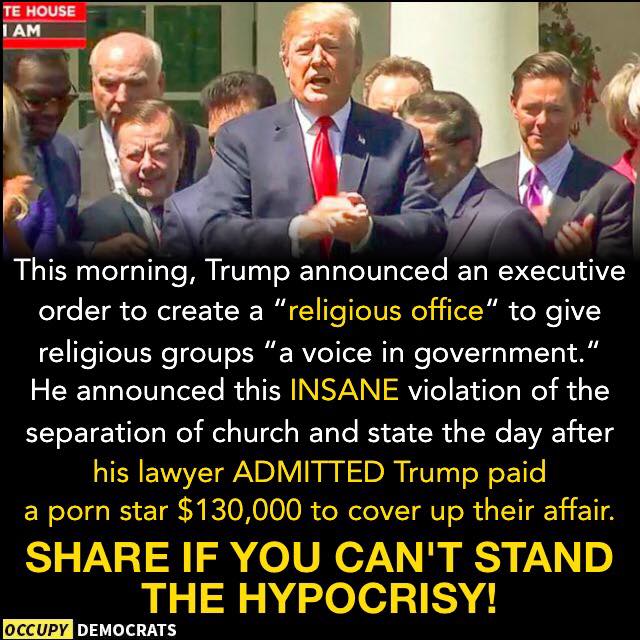In May 2018, President Trump established the White House Faith and Opportunity Initiative, in the Executive Office of the President of the United States. The administration said the initiative would give faith-based organizations a "voice in the White House."
The description of the initiative as a "religious office" did not come from the White House itself, and the meme left out the fact that Trump's 2018 initiative was not a radical new departure, but rather represented significant continuity from earlier similar initiatives in the presidencies of George W. Bush and Barack Obama.
On 3 May 2018, the "Occupy Democrats" Facebook page posted a meme which claimed that the president had violated the constitutional separation of church and state by setting up a "religious office":
President Trump did sign an executive order in May 2018 to establish a new faith-based initiative within the White House, but nobody from his administration called it a "religious office" — that description appears to have come from Occupy Democrats.
Furthermore, Trump's initiative represents significant continuity of, rather than a departure from, the previous two administrations. Although every detail and working of the new initiative has not yet been outlined, it certainly does not represent a radical change.
Trump's White House Faith and Opportunity Initiative bears a striking resemblance to the White House Office of Faith-Based and Community Initiatives, which George W. Bush set up in 2001, and which Barack Obama continued during his administration but renamed the White House Office of Faith-Based and Neighborhood Partnerships.
In brief, Trump's executive order — which he signed on 3 May 2018, the National Day of Prayer — replaces the White House Office of Faith-Based and Neighborhood Partnerships with the White House Faith and Opportunity Initiative, keeping it within the Executive Office of the President of the United States.
The executive order also sets out the following:
- The initiative will be led by an Advisor to the White House Faith and Opportunity Initiative, based out of the Office of Public Liaison.
- The executive order abolishes Obama's Advisory Council for Faith-Based and Neighborhood Partnerships
Beyond that, Trump's order is somewhat vague on the exact workings of the initiative and the duties of the advisor who will lead it:
- The initiative will consult with "experts and faith and various faith and community leaders" with an interest in poverty, religious freedom, education, crime prevention, "strengthening marriage and family," and other issues
- The advisor will give the president recommendations about policy relating to the services provided by faith-based and community organizations.
One potentially significant provision in the executive order calls for those in charge of the Faith and Opportunity Initiative to contact the Attorney General if they see potential executive branch violations of a religious liberty memorandum published by Attorney General Jeff Sessions in October 2017.
The Sessions memorandum reiterated the positions set out by Trump in an earlier executive order, in which the President wrote:
It shall be the policy of the executive branch to vigorously enforce Federal law’s robust protections for religious freedom.... All executive departments and agencies (agencies) shall, to the greatest extent practicable and to the extent permitted by law, respect and protect the freedom of persons and organizations to engage in religious and political speech.
President Trump has prioritized enhancing legal protections for religious freedom, including when it comes to obligations placed on faith-based organizations that receive federal funding, the freedom of employers and employees to abstain from practices (particularly in health care) which they feel compromise their religious beliefs, and in calling for an end to the Johnson Amendment, a long-standing provision that bars religious 501 (c)(3) non-profit groups from engaging in electoral activism.
In his 2001 executive order establishing the Office of Faith-Based and Community Initiatives, President George W. Bush emphasized that a driving force behind the policy was a desire to "level the playing field" in the disbursement of federal funding, and enhance the funding opportunities available for religious non-profit organizations — especially those focused on poverty, addiction, crime and other social issues:
The paramount goal is compassionate results, and private and charitable community groups, including religious ones, should have the fullest opportunity permitted by law to compete on a level playing field, so long as they achieve valid public purposes, such as curbing crime, conquering addiction, strengthening families and neighborhoods, and overcoming poverty. This delivery of social services must be results oriented and should value the bedrock principles of pluralism, nondiscrimination, evenhandedness, and neutrality.
The Occupy Democrats meme is largely accurate. In May 2018, Trump did indeed establish an initiative within the White House which would give faith-based organizations what the administration called a "voice in the White House." However, the description of the initiative as a "religious office" did not come from the Trump administration itself, and that is not its official name.
Furthermore, Trump's 2018 initiative represents significant continuity from predecessor offices set up by George W. Bush in 2001 and Barack Obama in 2009, although the exact focus, workings, and influence of Trump's initiative remain to be seen.
On 5 May, the "Being Liberal" Facebook page and web site published an article with the headline "Trump quietly signed an Executive Order allowing government to fund religious groups."
This is very misleading, and ignores the fact that the federal government has been providing grants, funding and tax write-offs to religious non-profit organizations for many years, including during the Obama administration. Trump's creation of the White House Faith and Opportunity Initiative did not usher in that state of affairs.


